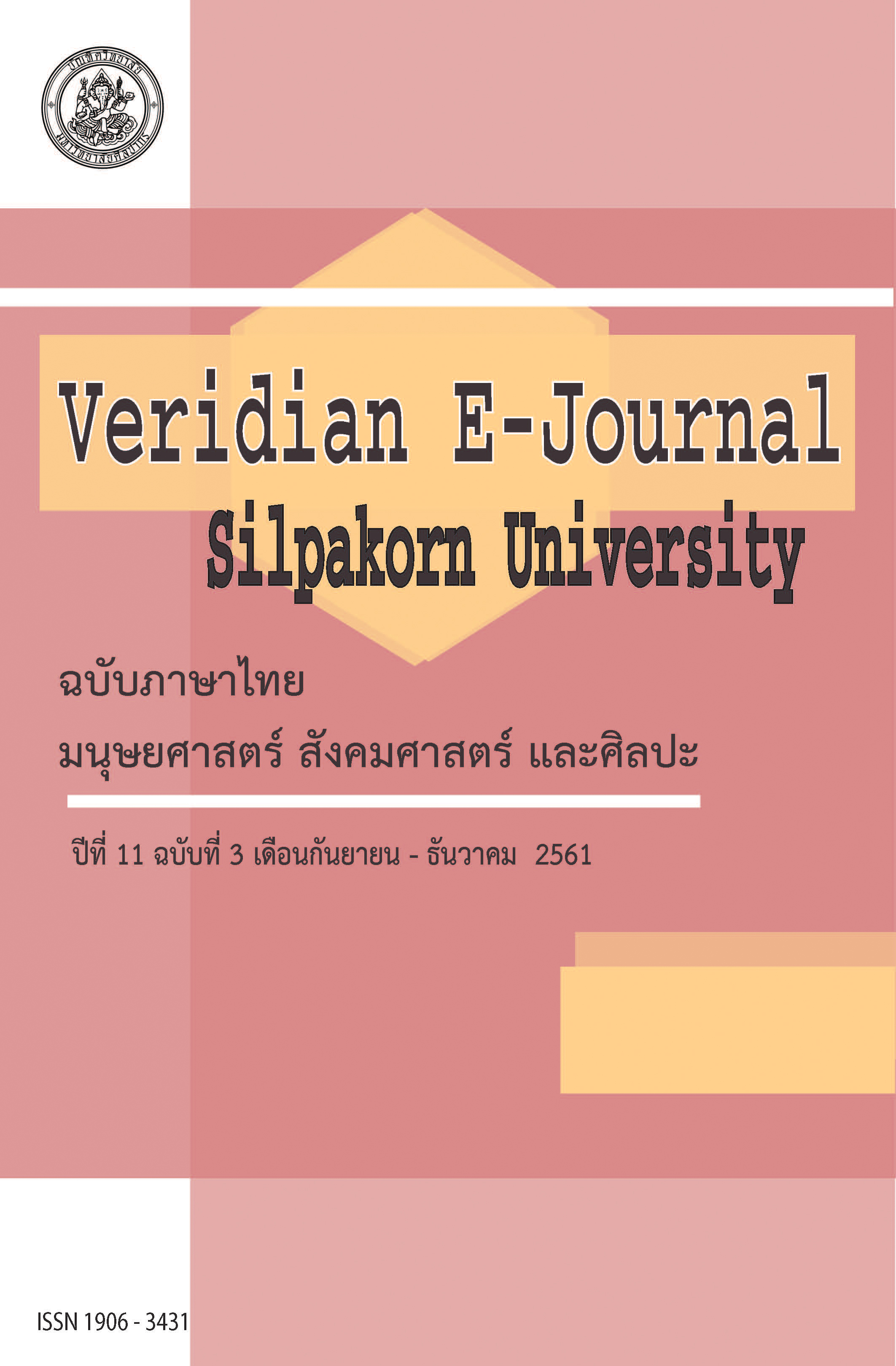การวิเคราะห์โมเดลองค์ประกอบเชิงยืนยันของการรับรู้กิจกรรมการท่องเที่ยวเชิงอาสาสมัครในกลุ่มสัตว์ของประเทศไทย (Confirmatory Factor Analysis of the Perception towards Animal-Related Voluntourism Activities in Thailand)
Main Article Content
Abstract
การท่องเที่ยวเชิงอาสาสมัครสามารถสร้างโอกาสการเรียนรู้และแบ่งปันให้เกิดขึ้นในสังคม เพราะฉะนั้นการเข้าใจความรู้สึกนึกคิดซึ่งกันและกันจะเป็นหนทางสู่การพัฒนาสังคมที่มีประสิทธิภาพอย่างยั่งยืน การวิจัยครั้งนี้มีวัตถุประสงค์เพื่อสำรวจองค์ประกอบการรับรู้ของนักท่องเที่ยวเชิงอาสาสมัครที่มีต่อกิจกรรมการท่องเที่ยวเชิงอาสาสมัครในกลุ่มสัตว์ของประเทศไทย และเพื่อตรวจสอบโมเดลองค์ประกอบการรับรู้ของนักท่องเที่ยวเชิงอาสาสมัครที่มีต่อกิจกรรมการท่องเที่ยวเชิงอาสาสมัครในกลุ่มสัตว์ของประเทศไทย ใช้ระเบียบวิธีวิจัยเชิงปริมาณโดยใช้แบบสอบถามเป็นเครื่องมือในการเก็บข้อมูล มาตราส่วนประมาณค่า 5 ระดับ กลุ่มตัวอย่างคือนักท่องเที่ยวอาสาสมัครชาวต่างชาติที่มาทำกิจกรรมอาสาร่วมกับสัตว์ในกรุงเทพมหานคร กาญจนบุรี และเพชรบุรี จำนวน 240 คน ใช้สถิติการวิเคราะห์องค์ประกอบเชิงสำรวจและการวิเคราะห์องค์ประกอบเชิงยืนยัน
ผลการวิจัยพบว่า ผลการวิเคราะห์โมเดลองค์ประกอบการรับรู้กิจกรรมการท่องเที่ยวเชิงอาสาสมัครในกลุ่มสัตว์ของประเทศไทย มี 21 ตัวแปร 5 องค์ประกอบ ได้แก่ ด้านลักษณะทางกายภาพ ด้านความรู้สึก ด้านความรู้ ด้านการมีส่วนร่วม และด้านความต้องการ เรียงลำดับความสำคัญตามค่าน้ำหนักองค์ประกอบ ซึ่งองค์ประกอบทั้ง 5 มีความสอดคล้องกลมกลืนกับข้อมูลเชิงประจักษ์ พิจารณาจาก ค่า χ2= 77.65, df= 93, relativeχ2= 0.834, p= 0.873 RMSEA= 0.000, RMR= 0.036, SRMR= 0.031, GFI= 0.961, AGFI= 0.903, NFI= 0.971, NNFI= 1.014 ระดับนัยสำคัญทางสถิติที่ 0.01 ดังนั้น โมเดลจึงสามารถใช้วัดการรับรู้กิจกรรมการท่องเที่ยวเชิงอาสาสมัครในกลุ่มสัตว์ของประเทศไทยได้ โดยผลการวิจัยนี้สามารถนำไปใช้เป็นกรอบแนวคิดการศึกษาและเป็นแนวทางการจัดการกิจกรรมการท่องเที่ยวเชิงอาสาสมัครในกลุ่มสัตว์ของประเทศไทยในอนาคต
Voluntourism can create the opportunities for learning and sharing in society. Consequently, understanding each other's opinion is the way to develop a sustainable society. Therefore, this study aims are to explore the perception components of voluntourists towards animal-related voluntourism activities in Thailand; to examine the perception components model of voluntourists towards animal-related voluntourism activities in Thailand. The quantitative approach is employed by using a 5-rating scales questionnaire for data collection with international voluntourists who participated in animal-related voluntourism activities in Bangkok, Kanchanaburi and Phetchaburi province, which comprises 240 participants. To analyze the data, an exploratory factor analysis and confirmatory factor analysis are carried out.
Findings reveal that there are 21 items which span five perception dimensions towards animal-related voluntourism activities in Thailand, which are as follows; physical, emotion, knowledge, practice and needs, listed in order of factor loading values respectively. Obtained fit indices indicated a good fit between the predicted and empirical factor structure, as follows; χ2= 77.65, df= 93, relativeχ2= 0.834, p= 0.873 RMSEA= 0.000, RMR= 0.036, SRMR= 0.031, GFI= 0.961, AGFI= 0.903, NFI= 0.971, NNFI= 1.014. The statistically significant level is 0.01. Therefore, the model can be used to measure perceptions towards animal-related voluntourism activities in Thailand. It can also be used as a framework for future studies, and as a guideline for managing animal-related voluntourism activities in Thailand.

